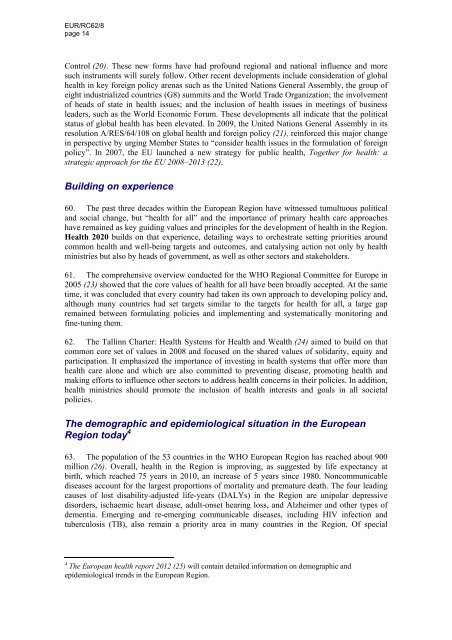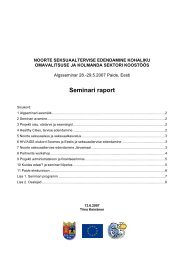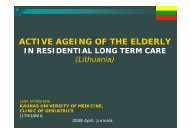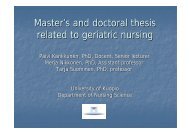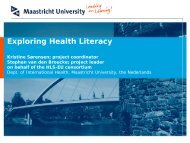EUR/RC62/wd08 (Eng) - WHO/Europe - World Health Organization
EUR/RC62/wd08 (Eng) - WHO/Europe - World Health Organization
EUR/RC62/wd08 (Eng) - WHO/Europe - World Health Organization
You also want an ePaper? Increase the reach of your titles
YUMPU automatically turns print PDFs into web optimized ePapers that Google loves.
<strong>EUR</strong>/<strong>RC62</strong>/8<br />
page 14<br />
Control (20). These new forms have had profound regional and national influence and more<br />
such instruments will surely follow. Other recent developments include consideration of global<br />
health in key foreign policy arenas such as the United Nations General Assembly, the group of<br />
eight industrialized countries (G8) summits and the <strong>World</strong> Trade <strong>Organization</strong>; the involvement<br />
of heads of state in health issues; and the inclusion of health issues in meetings of business<br />
leaders, such as the <strong>World</strong> Economic Forum. These developments all indicate that the political<br />
status of global health has been elevated. In 2009, the United Nations General Assembly in its<br />
resolution A/RES/64/108 on global health and foreign policy (21), reinforced this major change<br />
in perspective by urging Member States to “consider health issues in the formulation of foreign<br />
policy”. In 2007, the EU launched a new strategy for public health, Together for health: a<br />
strategic approach for the EU 2008–2013 (22).<br />
Building on experience<br />
60. The past three decades within the <strong>Europe</strong>an Region have witnessed tumultuous political<br />
and social change, but “health for all” and the importance of primary health care approaches<br />
have remained as key guiding values and principles for the development of health in the Region.<br />
<strong>Health</strong> 2020 builds on that experience, detailing ways to orchestrate setting priorities around<br />
common health and well-being targets and outcomes, and catalysing action not only by health<br />
ministries but also by heads of government, as well as other sectors and stakeholders.<br />
61. The comprehensive overview conducted for the <strong>WHO</strong> Regional Committee for <strong>Europe</strong> in<br />
2005 (23) showed that the core values of health for all have been broadly accepted. At the same<br />
time, it was concluded that every country had taken its own approach to developing policy and,<br />
although many countries had set targets similar to the targets for health for all, a large gap<br />
remained between formulating policies and implementing and systematically monitoring and<br />
fine-tuning them.<br />
62. The Tallinn Charter: <strong>Health</strong> Systems for <strong>Health</strong> and Wealth (24) aimed to build on that<br />
common core set of values in 2008 and focused on the shared values of solidarity, equity and<br />
participation. It emphasized the importance of investing in health systems that offer more than<br />
health care alone and which are also committed to preventing disease, promoting health and<br />
making efforts to influence other sectors to address health concerns in their policies. In addition,<br />
health ministries should promote the inclusion of health interests and goals in all societal<br />
policies.<br />
The demographic and epidemiological situation in the <strong>Europe</strong>an<br />
Region today 4<br />
63. The population of the 53 countries in the <strong>WHO</strong> <strong>Europe</strong>an Region has reached about 900<br />
million (26). Overall, health in the Region is improving, as suggested by life expectancy at<br />
birth, which reached 75 years in 2010, an increase of 5 years since 1980. Noncommunicable<br />
diseases account for the largest proportions of mortality and premature death. The four leading<br />
causes of lost disability-adjusted life-years (DALYs) in the Region are unipolar depressive<br />
disorders, ischaemic heart disease, adult-onset hearing loss, and Alzheimer and other types of<br />
dementia. Emerging and re-emerging communicable diseases, including HIV infection and<br />
tuberculosis (TB), also remain a priority area in many countries in the Region. Of special<br />
4 The <strong>Europe</strong>an health report 2012 (25) will contain detailed information on demographic and<br />
epidemiological trends in the <strong>Europe</strong>an Region.


